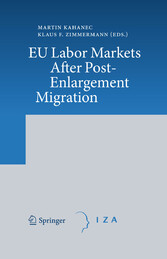Suchen und Finden

EU Labor Markets After Post-Enlargement Migration
Selected by Princeton University as Noteworthy Book in Industrial Relations and Labor Economics for 2010.
Are immigrants from the new EU member states a threat to the Western welfare state? Do they take jobs away from the natives? And will the source countries suffer from severe brain drain or demographic instability? In a timely and unprecedented contribution, this book integrates what is known about post-enlargement migration and its effects on EU labor markets. Based on rigorous analysis and hard data, it makes a convincing case that there is no evidence that the post-enlargement labor migrants would on aggregate displace native workers or lower their wages, or that they would be more dependent on welfare. While brain drain may be a concern in the source countries, the anticipated brain circulation between EU member states may in fact help to solve their demographic and economic problems, and improve the allocative efficiency in the EU. The lesson is clear: free migration is a solution rather than a foe for labor market woes and cash-strapped social security systems in the EU.
Alle Preise verstehen sich inklusive der gesetzlichen MwSt.














